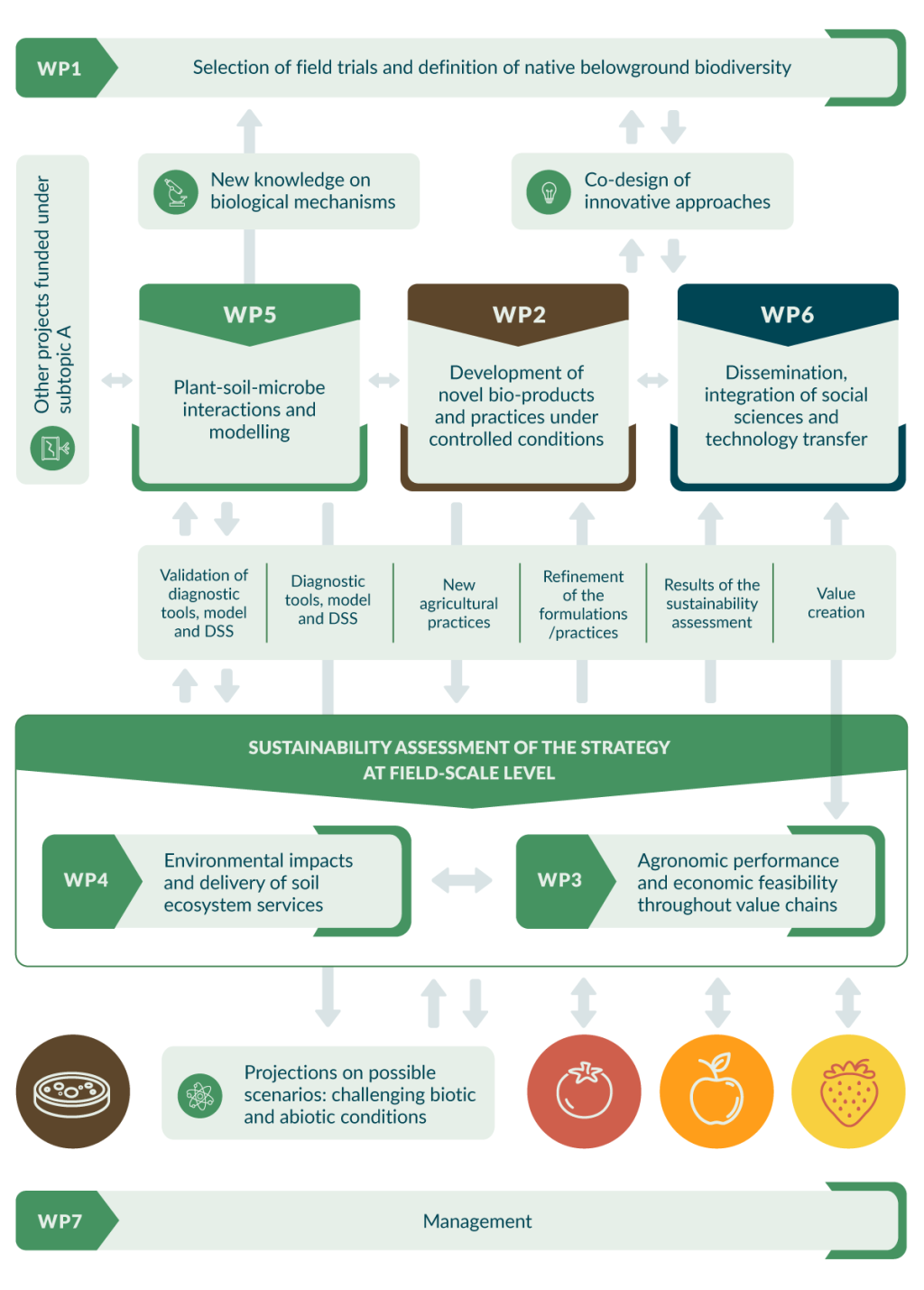
WP1 – SELECTION OF FIELD TRIALS AND DEFINITION OF NATIVE BELOWGROUND BIODIVERSITY:
This WP defines the field trials and crops under contrasting conditions across EU, planning the innovative and biodiversity-driven field management strategy. The overall native soil biodiversity will be assessed, providing the baseline for biodiversity dynamics assessment. Soils from the selected fields will be collected and delivered to partners involved in WP2 for the setup of the bio-products.
WP2 – DEVELOPMENT OF NOVEL PRODUCTS AND PRACTICES:
This WP will setup and implement novel bio-products and formulations by the industrial partners, identifying combinations of already available beneficial microbial strains with different bio-effectors for the selected cropping systems. Their activity will be assessed under controlled conditions (lab, greenhouse) in different soils. These actions will provide information to improve the efficacy of bio-inocula and bio-effectors, leading the best strategies for soil management supporting native biodiversity (with WP1, WP3 and WP6).
WP3 – AGRONOMIC PERFORMANCE AND ECONOMIC FEASIBILITY THROUGHOUT VALUE CHAINS:
The efficacy of the strategies defined in WP2 will be assessed under open-field conditions (e.g. reduction of chemical fertilizers and pesticides, increase of crops resilience to biotic/abiotic stresses in terms of yield as well as for their economic feasibility). Results will be the basis for the dissemination of the new management practices with improved value chains produced using the system approach. Model, DSS and other tools developed in WP5 will be refined and validated with farmers under field conditions
WP4 – ENVIRONMENTAL IMPACTS AND DELIVERY OF SOIL ECOSYSTEM SERVICES:
This WP will evaluate the effect of the use of bio-inocula on soil quality, soil biodiversity and ecosystem services (i.e. pest control, plant nutrient uptake, GHG, water availability, carbon sequestration), taking into account their multiscale dynamics. LCA-based methodologies will be used to assess the carbon footprint and the sustainability of the new approach.
WP5 – PLANT-SOIL-MICROBE INTERACTIONS AND MODELING:
This WP will investigate the interactions between plants, soils and micro-organisms and the mechanisms controlling plant resistance/resilience to biotic/abiotic stresses in the presence of bio-inocula. It will model the mechanisms underpinning biological interactions occurring in the soil useful to support farmer’s biodiversity-focused soil management as well as new diagnostic tools for monitoring the fate of microbial inoculants in the environment and profiling soil microbial communities (with WP2 and WP4).
WP6 – DISSEMINATION, INTEGRATION OF SOCIAL SCIENCES AND INNOVATION TRANSFER:
This WP will ensure that project results will be adequately transferred to key stakeholders. It will use various tools adapted to each of the target groups: scientific publications and conferences, professional events, training workshops or demonstration days for students of agricultural schools, farmers, experts, investors and authorities. A website with support tools to farming practitioners, technical leaflets and videos will be setup. Active actions will be addressed to EIP-AGRI Operational groups inviting them to participate and to contribute to the broad dissemination of the project results toward endusers.
WP1, 2, and 6 will function as an iterative loop for the design and preliminary farm testing (WP1), setup and improvement of innovative formulations (WP2) and their assessment with stakeholders (WP6), on the planned field studies. This iterative loop could run several (2-3) times during the project for as many cropping seasons as possible in the different case studies.
WP7 – PROJECT MANAGEMENT:
This WP encompasses all management tasks relevant to the implementation of the project. This includes organizing annual and committee meetings, preparing the periodic reports to the EC, managing financial and administrative issues, risks, intellectual property and ethical issues. The project and its impacts benefit women and men alike. All communications will be checked for gender neutrality. Any recruitment undertaken will conform to strict equal opportunities guidelines.
WP8 – ETHICS REQUIREMENTS:
This WP sets out the ethics requirements that the project must comply with. Тhese requirements include:
- providing details on the procedures and criteria used to identify / recruit research participants
- appointing of Data Protection Officer, Ethics Manager and Health and Safety Manager
- providing details on any type of participation of non EU countries in the research
- further information about the possible harm to the environment caused by the research and the measures that will be taken to mitigate the risks must be provided


